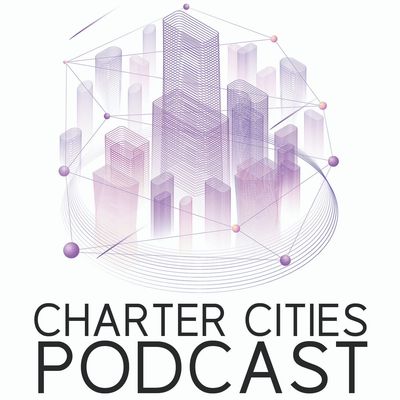The Charter Cities Podcast explores how charter cities can help solve some of the largest challenges of the 21st century, from urbanization to global poverty to migration. Each episode Mark Lutter interviews experts in international development, new cities, finance, entrepreneurship, and governance, to develop a better understanding of the various aspects of charter cities If you want to learn more visit the Charter Cities Institute at https://www.chartercitiesinstitute.org/
https://www.chartercitiesinstitute.org/
episode 36: The Royal Society of the Arts with Anton Howes
For the past 270 years, The Royal Society for the Encouragement of Arts, Manufactures and Commerce (RSA) has been the U. K's national improvement agency. If this sounds difficult to wrap your head around, it's because it is hard to pin down exactly what a national improvement agency does. Today's guest, Anton Howes, is a historian of innovation, and his first book is Arts and Minds: How the Royal Society of Arts Changed a Nation, where he unpacks this organizations. In today's episode, Anton offers insights into the RSA and how it has evolved over time. At different moments in history, it has played significant roles in influencing the social landscape. We hear about where the organization finds itself today and where some of the opportunities lie moving into the future. As a historical hub for innovation and invention, the RSA drew some formidable forces into its ranks. Our conversation also touches on the social status of inventors and how this can change, what we know about the nature of inventions, and whether you have to be an expert to be an inventor. Tune in to hear it all!
Key Points From This Episode:
• What The Royal Society for the Encouragement of Arts, Manufactures and Commerce is.
• Understanding a national improvement agency and the role it plays.
• Hear about what the draw of joining the RSA was.
• Precursors to the RSA and some of the problems with these organizations.
• Some of the changes the RSA undergoes in the 19th century.
• How the Great Exhibition of 1851 changed the landscape.
• How the 1800 utilitarian movement in the UK was similar to the progressive movement in the late 19th Century in the U.S.
• The influence that the utilitarian idea had on examinations and the long-lasting impact.
• The RSA’s work in conservationism and what the springboard for this was.
• Prince Phillip’s interest in conservation and how he influenced the RSA.
• What the RSA does today and what the future has in store for the organization.
• Opportunities Anton believes are being missed with the current structure of the RSA.
• How Anton would structure the new world fair and the sectors he would include.
• The importance of being able to showcase competing interests in public.
• Suggestions for how we can raise the social status of inventors.
• We should encourage innovation across all sectors of society.
• What Anton would do if he had 100 million dollars to change the status of the sciences.
• Which inventions were invented after their time and the consequence of this.
• What separates inventors from everyone else in society.
• How to build a culture of innovation and invention in a city or country.
• The reason that Anton left conventional academia.
• Unpacking the link between expertise and invention.
Links Mentioned in Today’s Episode:
Anton Howes
Arts and Minds: How the Royal Society of Arts Changed a Nation
The RSA
Silent Spring
Charter Cities Institute
Charter Cities Institute on Facebook
Charter Cities Institute on Twitter
